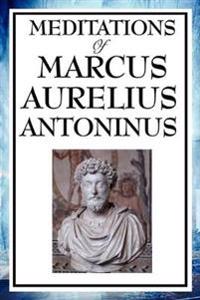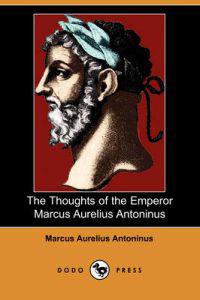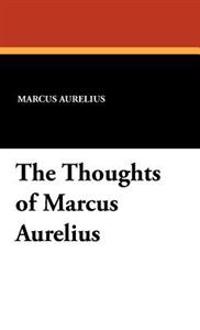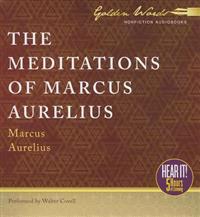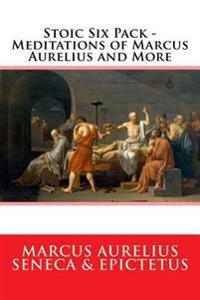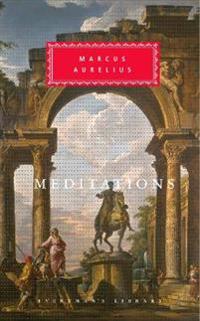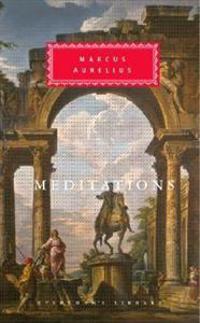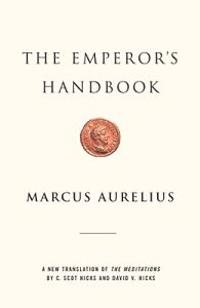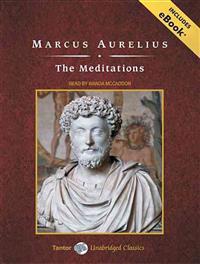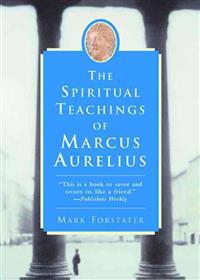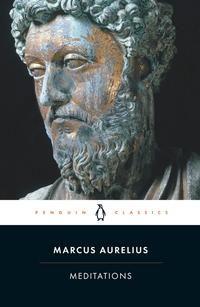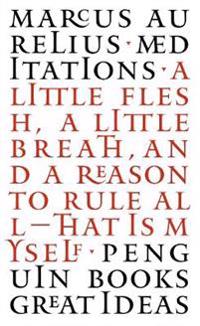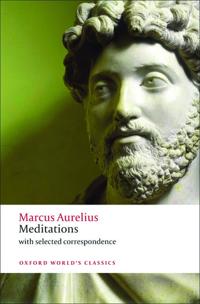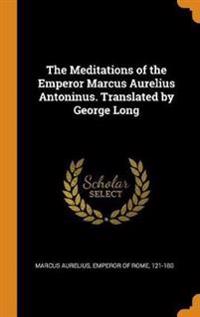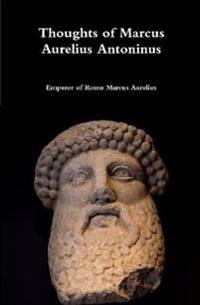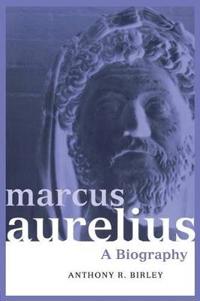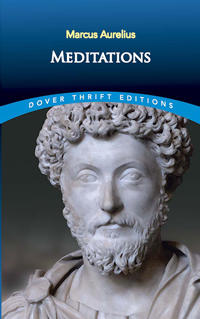The Meditations of Marcus Aurelius (Pocket)
avAurelius, Marcus, Marcus, Aurelius
ISBN: 9781420926118Marcus Annius Verus was born in Rome, A. D. 121, and assumed the name of Marcus Aurelius Antoninus, by which he is known to history, on his adoption by the Emperor T. Aurelius Antoninus. M. Aurelius was educated by the orator Fronto, but turned aside from rhetoric to the study of the Stoic philosoph[...]
Meditations of Marcus Aurelius Antoninus (Häftad)
avAurelius Marcus Antoninus
ISBN: 9781604595840 - UTGIVEN: 200812Meditations (Häftad)
avAurelius Marcus, Marcus Aurelius, Marcus
ISBN: 9780143036272 - UTGIVEN: 200509Throughout history, some books have changed the world. They have transformed the way we see ourselves--and each other. They have inspired debate, dissent, war and revolution. They have enlightened, outraged, provoked and comforted. They have enriched lives--and destroyed them.Now, Penguin brings you[...]
The Thoughts of the Emperor Marcus Aurelius Antoninus (Pocket)
avEmperor of Rome Marcus Aurelius, George (TRN) Long, Edwin (EDT) Ginn
ISBN: 9781409948810 - UTGIVEN: 2009-01The Thoughts of Marcus Aurelius (Inbunden)
avMarcus Aurelius
ISBN: 9781434458056 - UTGIVEN: 2012-08The Thoughts Of Marcus Aurelius Antoninus (Häftad)
avMarcus Aurelius
ISBN: 9781438505473 - UTGIVEN: 2008-11The Meditations of Marcus Aurelius (CD-bok)
avMarcus Aurelius, Walter Covell
ISBN: 9781469259840 - UTGIVEN: 2013-01Marcus Aurelius was Roman Emperor from 161 C.E. to his death in 180 C.E. He was destined to be a leader, having been born into a prominent family - one related by blood and marriage to rulers and bankers. During his era, Romans who inherited power and vast fortunes were expected to set an example. M[...]
Stoic Six Pack - Meditations of Marcus Aurelius and More: The Complete Stoic Collection (Häftad)
avMarcus Aurelius, Seneca, Epictetus
ISBN: 9781503259430 - UTGIVEN: 2014-11Meditations (Inbunden)
avMarcus Aurelius, Marcus Aurelius
ISBN: 9781857150551 - UTGIVEN: 199204The Roman emperor Marcus Aurelius Antoninus (AD 121-180) embodied in his person that ideal figure of antiquity, the philosopher-king. His "Meditations" reveal a mind of exceptional clarity and originality and a spirit attuned to the particulars of human destiny.[...]
The Meditations of Marcus Aurelius (Häftad)
avMarcus Aurelius
ISBN: 9781907523502 - UTGIVEN: 201102Meditations (Inbunden)
avAurelius Marcus, D. A. Rees
ISBN: 9780679412717 - UTGIVEN: 199206The Roman emperor Marcus Aurelius Antoninus (a.d. 121--180) embodied in his person that deeply cherished, ideal figure of antiquity, the philosopher-king. His "Meditations "are not only one of the most important expressions of the Stoic philosophy of his time but also an enduringly inspiring guide t[...]
The Emperor's Handbook: A New Translation of the Meditations (Inbunden)
avAurelius Marcus
ISBN: 9780743233835 - UTGIVEN: 200211BEAR IN MIND THAT THE
MEASURE OF A MAN IS THE WORTH OF THE THINGS HE CARES ABOUT.
IF IT IS GOOD TO SAY OR DO
SOMETHING, THEN IT IS
EVEN BETTER TO BE CRITICIZED FOR
HAVING SAID OR DONE IT.
ARE MY GUIDING PRINCIPLES
HEALTHY AND ROBUST? ON THIS HANGS EVERYTHING.
Essay[...]The Meditations (CD-bok)
avEmperor of Rome Marcus Aurelius, Wanda (NRT) McCaddon, Emperor of Rome Marcus Aurelius
ISBN: 9781400165490 - UTGIVEN: 2009-12The Spiritual Teachings of Marcus Aurelius (Häftad)
avMark Forstater
ISBN: 9780060955106 - UTGIVEN: 2001-06Written as a personal diary for spiritual development, Marcus Aurelius's "meditations" were not meant for publication nor posterity, yet the Roman emperor and Stoic philosopher has provided inspiration and guidance for more than eighteen centuries. Now, after nearly two thousand years, Mark Forste[...]
Meditations (Storpocket)
avMarcus Aurelius
ISBN: 9780140449334 - UTGIVEN: 200604Originally written only for his personal consumption, Marcus Aurelius' "Meditations" has become a key text in the understanding of Roman Stoic philosophy. This "Penguin Classics" edition is translated with notes by Martin Hammond and an introduction by Diskin Clay. Written in Greek by an intellectua[...]
Meditations (Pocket)
avMarcus Aurelius
ISBN: 9780141018829 - UTGIVEN: 200409Throughout history, some books have changed the world. They have transformed the way we see ourselves and each other. They have inspired debate, dissent, war and revolution. They have enlightened, outraged, provoked and comforted. They have enriched lives and destroyed them. Now Penguin brings you t[...]
Meditations (Inbunden)
avEmperor of Rome Marcus Aurelius, Martin (TRN) Hammond, Coralie (ILT) Bickford-smith
ISBN: 9780141395869 - UTGIVEN: 2015-04Written in Greek without any intention of publication, this book offers spiritual reflections and exercises developed by the author, as the leader who struggled to understand himself and make sense of the universe. It covers topics such as: the question of virtue, human rationality, the nature of th[...]
Meditations (Häftad)
avMarcus Aurelius
ISBN: 9780199573202 - UTGIVEN: 201109'Do not act as if you had ten thousand years to live ...while you have life in you, while you still can, make yourself good.' The Meditations of Marcus Aurelius (AD 121-180) is a private notebook of philosophical reflections, written by a Roman emperor probably on military campaign in Germany. In [...]
Marcus Aurelius: Meditations, Books 1-6 (Inbunden)
avProfessor Christopher Gill
ISBN: 9780199694839 - UTGIVEN: 2013-09-01Christopher Gill provides a new translation and commentary on the first half of Marcus Aurelius' Meditations, and a full introduction to this unique and remarkable work: a reflective diary or notebook by a Roman emperor, whose content is based on Stoic philosophy but presented in a highly distinctiv[...]
The Meditations of the Emperor Marcus Aurelius Antoninus. Translated by George Long
ISBN: 9780343032937 - UTGIVEN: 2018-10Marcus Aurelius: A Biography (Häftad)
avAnthony R. Birley
ISBN: 9780415171250 - UTGIVEN: 200008Marcus Aurelius, the philosopher-emperor who ruled the Roman Empire between AD 161 and 180, is one of the best recorded individuals from antiquity. Even his face became more than usually familiar: the imperial coinage displayed his portrait for over 40 years, from the clean-shaven young heir of Anto[...]
Meditations (Häftad)
avMarcus Aurelius
ISBN: 9780486298238 - UTGIVEN: 199802Introduction by D. A. Rees; Translation by A. S. L. Farquarson


